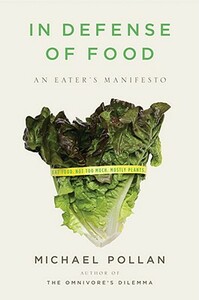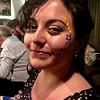You need to sign in or sign up before continuing.
Take a photo of a barcode or cover
While I am very interested in food, cooking, health, and food culture, this book did not do it for me. As compared to Kingsolver's "Animal, Vegetable, Miracle," this book felt much more preach-y and as though it's main prerogative was to prescribe a certain diet.
I do want to read Pollan's "The Omnivore Dilemma," but could not get myself to get into this one.
I do want to read Pollan's "The Omnivore Dilemma," but could not get myself to get into this one.
this is a "sequel" to the omnivore's dilemma which i have not yet read. i found this book to be very interesting and it stood on its own just fine. the "manifesto" can be summed up in 7 words: eat food. not too much. mostly plants. and that's printed right on the cover. the book goes on to elaborate on this manifesto, explaining that we should "eat food" as opposed to the over-processed stuff crowding grocery store shelves today. he talks about how the government doesn't require companies to label food as "imitation" and how that's hurting us. he talks about how we should steer clear of any foods with "health claims" on the front because that general means it's been engineered and that the health claims will shift with the prevailing winds (this is why twizzlers scream that they are "low-fat" because that is the "evil" nutrient of the day). he talks about the business of nutritionism and how it makes money off of our fears and teaches us an unhealthy dependence on "professionals" (doctors, nutritionists) to tell us what to eat when our ancestors ate and survived just fine without any help and when the "science" of nutrition is so very inexact and so many factors are unknown. he tells readers that we shouldn't eat food that our grandmothers wouldn't recognize as food and we should stick to foods with 5 pronouncable ingredients or less. i enjoyed the book and it renewed my resolve to pay closer attention to the food that i eat and steer clear of "faux food." the reader of this audiobook is a little too.... dramatic... for the text, in my opinion. i would have preferred a little more down-home rendition, but if you can get past that, it's an easy way to absorb the information between errands around town.
big fan, easy read about what we eat and how it has changed over the last couple hundred years
"eat food, mostly plants, not too much" - Pollan
"eat food, mostly plants, not too much" - Pollan
This was an interesting take on how viewing foods simply as nutrient sources to dissect and choose from reduces their cumulative health value.
The author was pretty arrogant, and used many of the same faulty food science he condemned, but his points were generally sound.
The author was pretty arrogant, and used many of the same faulty food science he condemned, but his points were generally sound.
It's more like two books: one a history of science debunking "nutritionism" followed by brief and more standard self-help type book with Pollan's standard dictates: i.e. eat food, mostly plant, don't eat anything your great-grandmother wouldn't recognize as food, eat from the outside edges of the supermarket, etc. If you don't already know that you should be eating vegetables instead of Lunchables, though, you're probably not the ideal audience for this book.
informative
medium-paced
I'm sure at the time this was published, the author was writing to a general public who was less informed and less involved in the discourse around food, health, and their collective regulation. It remains well written and I enjoy Pollan's style. However, I struggle to recommend this book because a large chunk of the information is already dated and/or some of the assertions have been called into question.
One of the best books on eating and food and nutrition and science and industry and farming and politics and culture and how they all interrelate. Yes, it is all in there, in all the gory details, very well-written, easy to read, but still very detailed. I thought I knew all this stuff already, but I most assuredly did not, as it turns out.
So, just read it. It won't take long, and then you'll be informed and able to make changes in your eating habits that will very likely make you happier and healthier. Or at least eating more *real food*.
The "rules" are almost too easy to remember:
Eat Food, Not Too Much, Mostly Plants.
The key here is that the definition of food is basically what your great-grandma would recognize as food.
So, just read it. It won't take long, and then you'll be informed and able to make changes in your eating habits that will very likely make you happier and healthier. Or at least eating more *real food*.
The "rules" are almost too easy to remember:
Eat Food, Not Too Much, Mostly Plants.
The key here is that the definition of food is basically what your great-grandma would recognize as food.
Solid argument that deserves more public appreciation, ruined by poor style and unprofessional approach.
This was a bit of a disappointment. I so enjoyed [b:The Omnivore's Dilemma: A Natural History of Four Meals|3109|The Omnivore's Dilemma A Natural History of Four Meals|Michael Pollan|https://images.gr-assets.com/books/1393804353s/3109.jpg|3287769] and I had high hopes for this one. In all honesty the book may have fared better if I hadn't already read the other. The first half or more of the book mostly seemed to gloss the information found in the previous book. The "rules" portion was more promising and interesting. Although, in complete disclosure, I think I liked the rules because they simply reinforce the opinions I already have.
The whole book is lacking in writing style and organization (surprising, as these were two of his most obvious strengths before). It is also heavy on author opinion. That is fine, but not terribly informative and not what I had come to expect from Pollan. The author tends to ramble and it just didn't capture my attention.
The book does, however, have a very interesting premise. I had never before considered quite how detrimental our obsession with nutrients and food science could be. It is an intriguing perspective.
The whole book is lacking in writing style and organization (surprising, as these were two of his most obvious strengths before). It is also heavy on author opinion. That is fine, but not terribly informative and not what I had come to expect from Pollan. The author tends to ramble and it just didn't capture my attention.
The book does, however, have a very interesting premise. I had never before considered quite how detrimental our obsession with nutrients and food science could be. It is an intriguing perspective.






